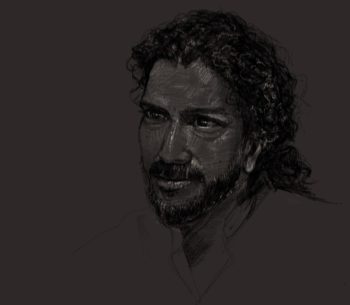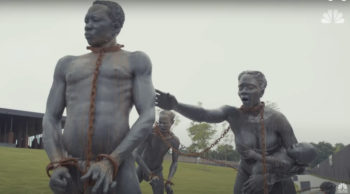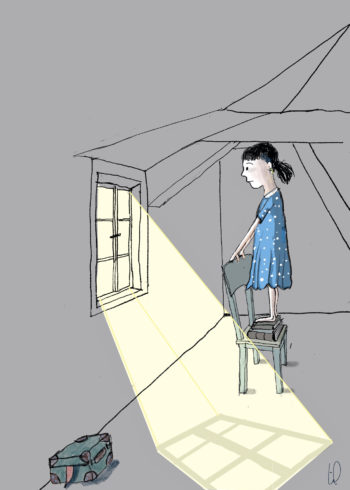Lernt ihr unsere Namen. Wie Hanau an der Gemeinsamkeit baut.
Text: Newroz Duman
Apr 30th 2020
Rassistisch motivierte, rechtsterroristische Anschläge wie in Hanau im Februar 2020 kommen vermehrt in die Öffentlichkeit, doch eine gründliche Aufklärung hinkt meist noch – der Fall NSU ist hier bestes Beispiel für die Verharmlosung rechter Gewalt und Ideologie. Die Hanauer antirassistische Aktivistin Newroz Duman stellt sich die Frage, wie Trauer und Wut umgewandelt werden können, um rassistischem Gedankengut entgegenwirken zu können. Der Schmerz soll dabei als Anfang dienen, um ein gegenseitiges Kennenlernen über alle gesellschaftlichen Unterschiede hinweg zu initiieren.
Read more
To catch those unrecorded gestures: Kultur und Geschichte von ausgelassenen Positionen aus betrachten
Text: Neele Remmers
Feb 23rd 2021
Im Schreiben literarischer Werke schaffte sowohl Virginia Woolf als auch James Baldwin sich einen Raum, um eine andere Wahrnehmung oder Auffassung von etwas beschreiben, was Teil ihrer Kultur war, sie jedoch nur begrenzt Zugang hatten. Was dieser Raum eröffnet, untersucht Neele Remmers in ihrem Essay.
Read more
The Diasporic Schools: A lecture by Achille Mbembe
Nov 3rd 2020
In his online-lecture for the Public Program of The Diasporic Schools, organised by the Kunstenfestivaldesarts Bruxelles, Achille Mbembe shares some of his thoughts about reparative globalism and the possibility of thinking about a common world in the anthropogenic age. Grounding his reflection in the African diasporic experience and its “fundamental precariousness”, he invites to “rethink […]
Read more
«The Winter of Absolute Zero»: Interview with Shaj Mohan
Text: Auwn Gurmani
Jun 2nd 2020
The philosopher Shaj Mohan talks in the interview with Auwn Gurmani about hypophysics, a thinking that identifies Gandhi’s description of the “good value” of a thing with “natural state”. He notes that hypophysics is a species of racism. The idyllic a priori that Gandhi refers to corresponds to the experiences of privileged groups, the life of the highest castes. This idyll is maintained by colonial conditions. As an alternative, Shaj Mohan pleads for a “world democracy”, which we achieve through the obscure experience.
Read more
“I can’t breathe”: Riots against racism as new grounds for international solidarity
Jun 23rd 2020
“I can’t breathe”: the last sentence of the African-American George Floyd, who was stifled by the Minneapolis police, resonates powerfully in the context of the Covid-19 pandemic. Indeed, the global health crisis has highlighted the inequalities in health care systems, especially in the US, where the African-American population is particularly affected. Beyond police violence, it […]
Read more
«The silence on the streets should never be mistaken for a quiet submission in politics» – An interview with Shaj Mohan
Text: Krithika Varagur
Jul 12th 2020
In the interview with Krithika Varagur philosopher Shaj Mohan talks about the protests in India and its similarities to the situation in the United States. He points out that what we perceive as extreme events, such as pogroms and lynching, are prepared by everyday discriminations.
Read more
Monuments Across the United States Re-Emerged as Targets of Rage
Jun 10th 2020
Amid the wave of protests over police violence shaking the United States, public monuments of all kinds have become symbolic flash points. But the destruction or removal of statues is not necessarily the right way to deal with the unloved historical heritage.
Read more
Der Schwarzenbach-Komplex. Ein kollektives Langzeitprojekt zu vielstimmiger Erinnerungspolitik von ké*sarà
Text: Damian Christinger
Aug 29th 2020
Ein Interview mit Catia Porri und Rohit Jain zum Schwarzenbach-Komplex, einem künstlerisch-ethnographischen Langzeit-Forschungsprojekt, das vom Sozialanthropologen Rohit Jain, dem Theaterschaffenden Tim Zulauf und der Historikerin Paola De Martin gegründet wurde und das 50-Jahre-Jubiläum der Schwarzenbach-Initiative zum Anlass für ein künstlerisch-ethnografisches Langzeitprojekt nimmt und am Theaterspektakel 2020 gestartet ist. Mit diesem Projekt wollen sie an die lange Tradition der Fremdenfeindlichkeit und des strukturellen Rassismus in der Schweiz erinnern.
Read more



